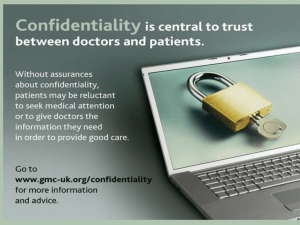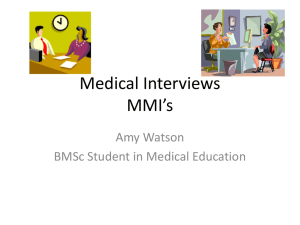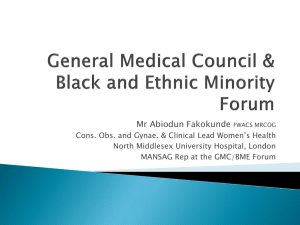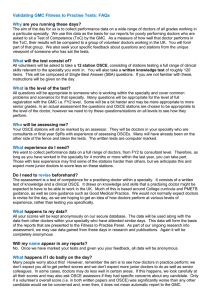Doctors’ use of social media
advertisement
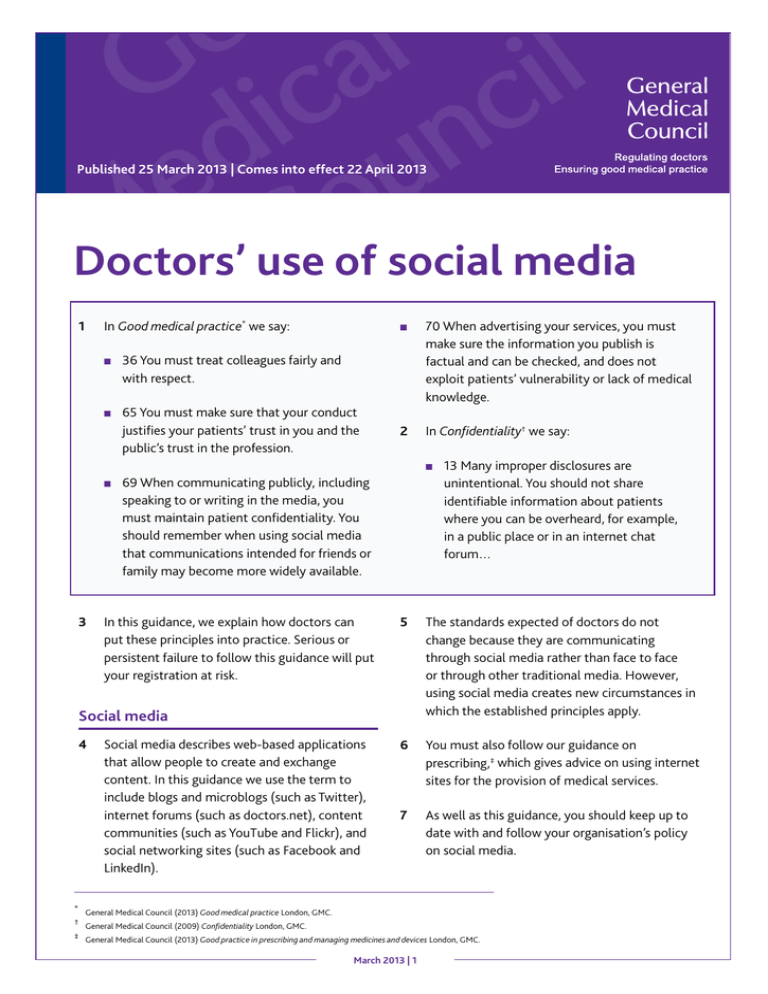
Published 25 March 2013 | Comes into effect 22 April 2013 Doctors’ use of social media 1 In Good medical practice* we say: n n 36 You must treat colleagues fairly and with respect. 65 You must make sure that your conduct justifies your patients’ trust in you and the public’s trust in the profession. n 3 n 70 When advertising your services, you must make sure the information you publish is factual and can be checked, and does not exploit patients’ vulnerability or lack of medical knowledge. 2 In Confidentiality† we say: n 69 When communicating publicly, including speaking to or writing in the media, you must maintain patient confidentiality. You should remember when using social media that communications intended for friends or family may become more widely available. In this guidance, we explain how doctors can put these principles into practice. Serious or persistent failure to follow this guidance will put your registration at risk. 5 The standards expected of doctors do not change because they are communicating through social media rather than face to face or through other traditional media. However, using social media creates new circumstances in which the established principles apply. 6 You must also follow our guidance on prescribing,‡ which gives advice on using internet sites for the provision of medical services. 7 As well as this guidance, you should keep up to date with and follow your organisation’s policy on social media. Social media 4 Social media describes web-based applications that allow people to create and exchange content. In this guidance we use the term to include blogs and microblogs (such as Twitter), internet forums (such as doctors.net), content communities (such as YouTube and Flickr), and social networking sites (such as Facebook and LinkedIn). * 13 Many improper disclosures are unintentional. You should not share identifiable information about patients where you can be overheard, for example, in a public place or in an internet chat forum… General Medical Council (2013) Good medical practice London, GMC. † General Medical Council (2009) Confidentiality London, GMC. ‡ General Medical Council (2013) Good practice in prescribing and managing medicines and devices London, GMC. March 2013 | 1 Doctors’ use of social media Privacy 8 Using social media has blurred the boundaries between public and private life, and online information can be easily accessed by others. You should be aware of the limitations of privacy online and you should regularly review the privacy settings for each of your social media profiles.* This is for the following reasons. a Social media sites cannot guarantee confidentiality whatever privacy settings are in place. b c Information about your location† may be embedded within photographs and other content and available for others to see. d Once information is published online it can be difficult to remove as other users may distribute it further or comment on it. Patients, your employer and potential employers, or any other organisation that you have a relationship with, may be able to access your personal information. The benefits and risks of using social media 9 Doctors’ use of social media can benefit patient care by: a engaging people in public health and policy discussions b establishing national and international professional networks c facilitating patients’ access to information about health and services. * Maintaining boundaries 10 Using social media also creates risks, particularly where social and professional boundaries become unclear. You must follow the guidance in Maintaining a professional boundary between you and your patient.‡ 11 If a patient contacts you about their care or other professional matters through your private profile, you should indicate that you cannot mix social and professional relationships and, where appropriate, direct them to your professional profile. Maintaining confidentiality 12 Many doctors use professional social media sites that are not accessible to the public. Such sites can be useful places to find advice about current practice in specific circumstances. However, you must still be careful not to share identifiable information about patients. 13 Although individual pieces of information may not breach confidentiality on their own, the sum of published information online could be enough to identify a patient or someone close to them. 14 You must not use publicly accessible social media to discuss individual patients or their care with those patients or anyone else. Respect for colleagues 15 Good medical practice says that doctors must treat colleagues fairly and with respect.§ This covers all situations and all forms of interaction and communication. You must not bully, harass or make gratuitous, unsubstantiated or unsustainable comments about individuals online. For practical advice in setting privacy settings for social media sites, see Using social media: practical and ethical guidance for doctors and medical students (2011), published by the British Medical Association † Such as Global Positioning System (GPS) coordinates. ‡ General Medical Council (2013) Maintaining a professional boundary between you and your patient London, GMC. § General Medical Council (2013) Good medical practice London, GMC, paragraph 36. March 2013 | 2 Doctors’ use of social media 16 When interacting with or commenting about individuals or organisations online, you should be aware that postings online are subject to the same laws of copyright and defamation* as written or verbal communications, whether they are made in a personal or professional capacity.† Anonymity 17 If you identify yourself as a doctor in publicly accessible social media, you should also identify yourself by name. Any material written by authors who represent themselves as doctors is likely to be taken on trust and may reasonably be taken to represent the views of the profession more widely.‡ 18 You should also be aware that content uploaded anonymously can, in many cases, be traced back to its point of origin.§ Conflicts of interest 19 When you post material online, you should be open about any conflict of interest and declare any financial or commercial interests in healthcare organisations or pharmaceutical and biomedical companies.¶ * Other sources of information British Medical Association (2011) Using social media: practical and ethical guidance for doctors and medical students London, British Medical Association, 1st edition Australian Medical Association Council of Doctorsin-Training, New Zealand Medical Association Doctors-in-Training Council, New Zealand Medical Students’ Association, Australian Medical Students’ Association (2010) Social media and the medical profession – a guide to online professionalism for medical practitioners and medical students Canberra, Australian Medical Association Mansfield SJ, Morrison SG, Stephens HO, et al (2011) Social media and the medical profession Med J Aust 194: 642–44 2011 Canadian Medical Association (2011) Social media and Canadian physicians – issues and rules of engagement Ottawa, Canadian Medical Association College of Physicians and Surgeons of British Columbia (2010) Social media and online networking forums Vancouver, College of Physicians and Surgeons of British Columbia Defamation is the act of making an unjustified statement about a person or organisation that is considered to harm their reputation. † [2008] EWHC 1781 (QB). ‡ General Medical Council (2013) Good medical practice London, GMC, paragraph 69. § [2008] EWHC 1781 (QB). ¶ You must follow our guidance on financial and commercial arrangement and conflicts of interest. General Medical Council (2013) Financial and commercial arrangements and conflicts of interest London, GMC. Published March 2013 © 2013 General Medical Council The GMC is a charity registered in England and Wales (1089278) and Scotland (SC037750) Code: GMC/DUSM/0313 March 2013 | 3
